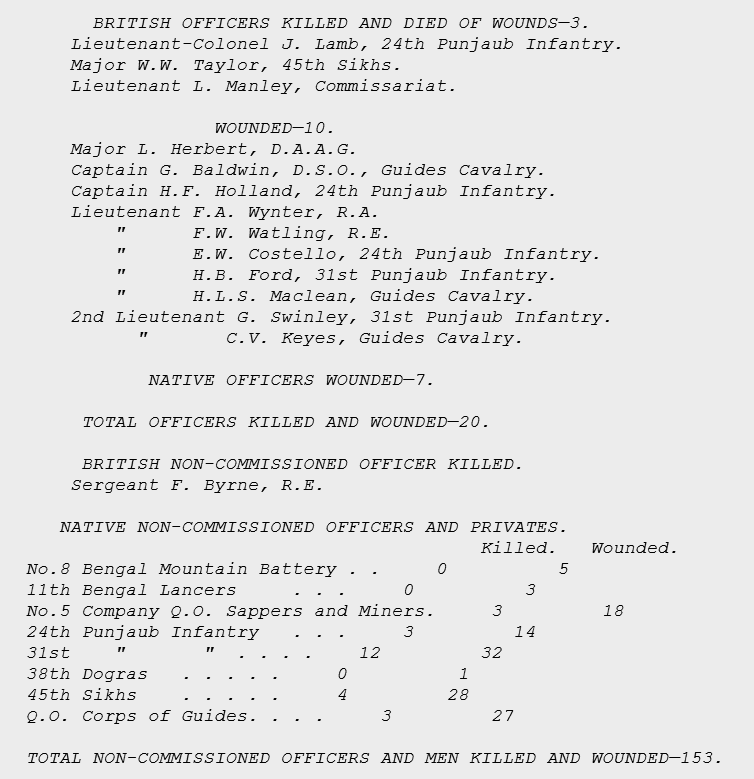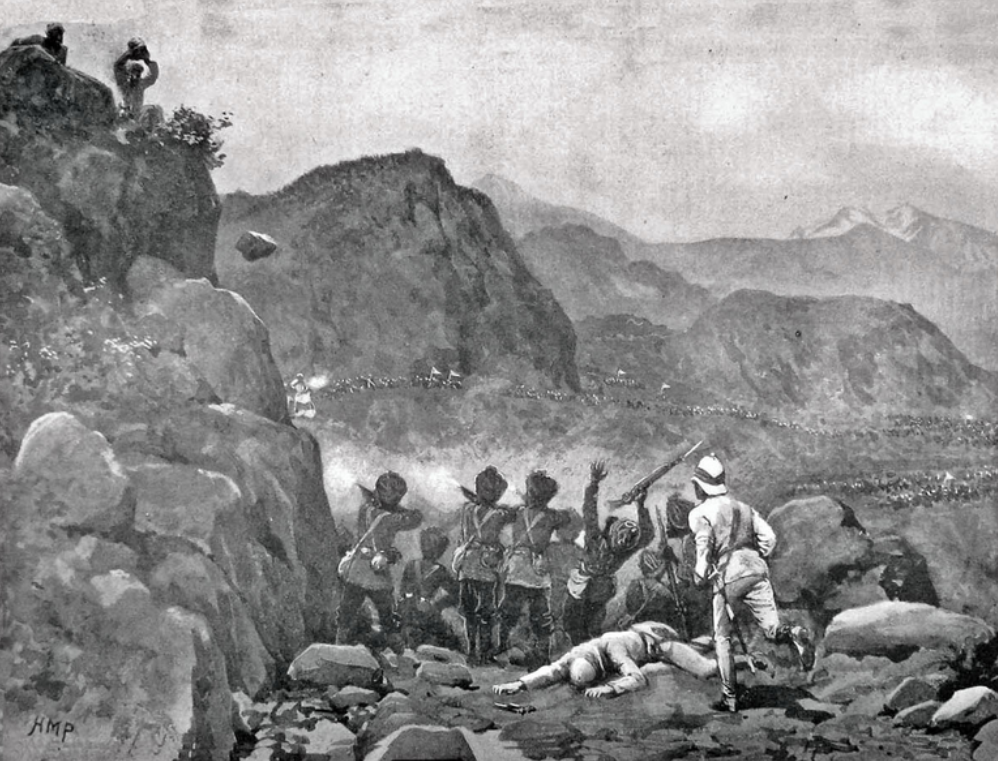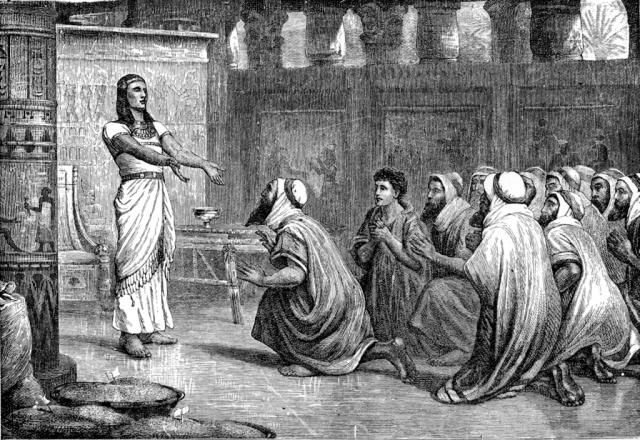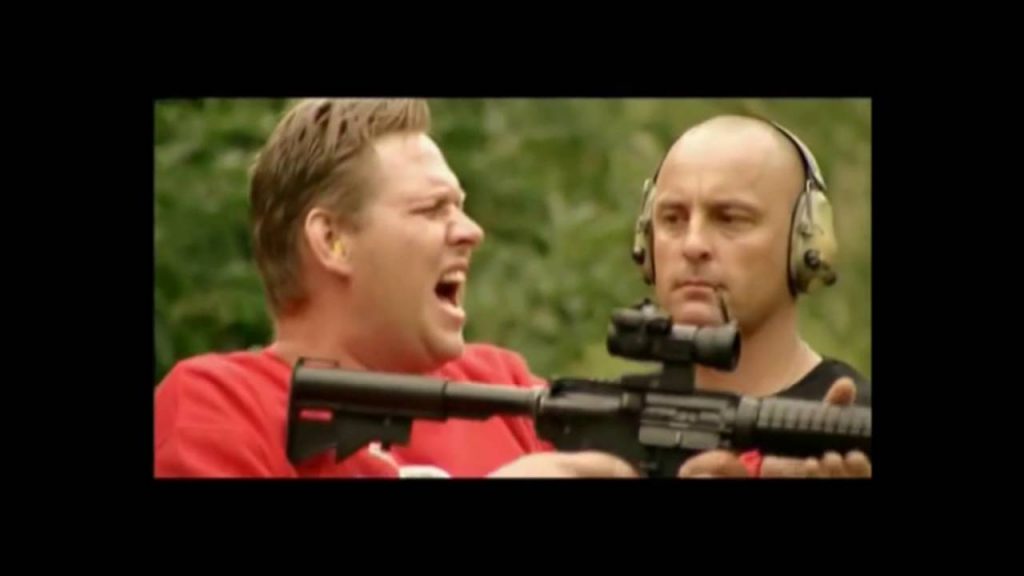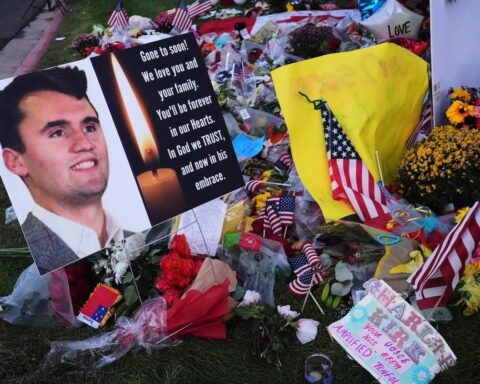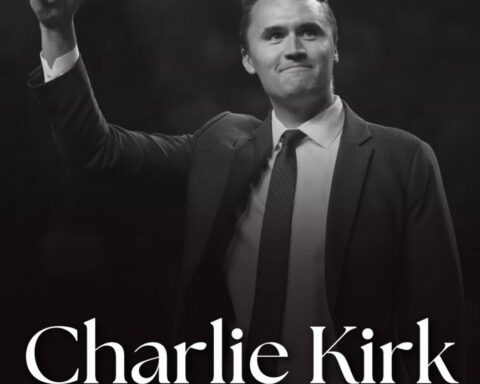Editor’s note: Here follows the fourth chapter of The Story of the Malakand Field Force: An Episode of Frontier War, by Winston S. Churchill (published 1898). All spelling in the original.
(Continued from Part 3)
Chapter IV: The Attack on the Malakand
Cry “Havoc” and let slip the dogs of war. – “Julius Caesar,” Act iii., Sc.i.
It has long been recognised by soldiers of every nation that, to resist a vigorous onslaught by night, is almost the hardest task that troops can be called upon to perform. Panics, against which few brave men are proof, arise in a moment from such situations. Many a gallant soldier has lost his head. Many an experienced officer has been borne down unheeded by a crowd of fugitives. Regiments that have marched unflinchingly to almost certain death on the battlefield, become in an instant terrified and useless.
In the attack on the Malakand camp, all the elements of danger and disorder were displayed. The surprise, the darkness, the confused and broken nature of the ground; the unknown numbers of the enemy; their merciless ferocity; every appalling circumstance was present. But there were men who were equal to the occasion. As soon as the alarm sounded Lieutenant-Colonel McRae of the 45th Sikhs, a holder of the Gold Medal of the Royal Humane Society and of long experience in Afghanistan and on the Indian frontier, ran to the Quarter Guard, and collecting seven or eight men, sent them under command of Major Taylor, of the same regiment, down the Buddhist road to try and check the enemy’s advance. Hurriedly assembling another dozen men, and leaving the Adjutant, Lieutenant Barff, with directions to bring on more, he ran with his little party after Taylor in the direction of the entrance gorge of the Kotal camp. Two roads give access to the Malakand camp, from the plain of Khar. At one point the Buddhist road, the higher of the two, passes through a narrow defile then turns a sharp corner. Here, if anywhere, the enemy might be held or at least delayed until the troops got under arms. Overtaking Major Taylor, Colonel McRae led the party, which then amounted to perhaps twenty men, swiftly down the road, It was a race on which the lives of hundreds depended. If the enemy could turn the corner, nothing could check their rush, and the few men who tried to oppose them would be cut to pieces. The Sikhs arrived first, but by a very little. As they turned the corner they met the mass of the enemy, nearly a thousand strong, armed chiefly with swords and knives, creeping silently and stealthily up the gorge, in the hope and assurance of rushing the camp and massacring every soul in it. The whole road was crowded with the wild figures. McRae opened fire at once. Volley after volley was poured into the dense mass, at deadly range. At length the Sikhs fired independently. This checked the enemy, who shouted and yelled in fury at being thus stopped. The small party of soldiers then fell back, pace by pace, firing incessantly, and took up a position in a cutting about fifty yards behind the corner. Their flanks were protected on the left by high rocks, and on the right by boulders and rough ground, over which in the darkness it was impossible to move. The road was about five yards wide. As fast as the tribesmen turned the corner they were shot down. It was a strong position.
In that strait path a thousand
Might well be stopped by three
Being thus effectively checked in their direct advance, the tribesmen began climbing up the hill to the left and throwing down rocks and stones on those who barred their path. They also fired their rifles round the corner, but as they were unable to see the soldiers without exposing themselves, most of their bullets went to the right.
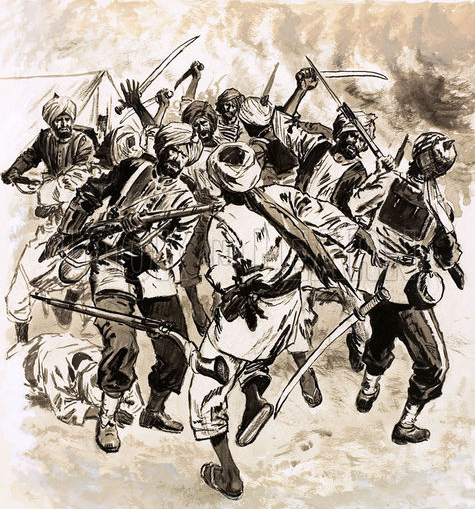
The band of Sikhs were closely packed in the cutting, the front rank kneeling to fire. Nearly all were struck by stones and rocks. Major Taylor, displaying great gallantry, was mortally wounded. Several of the Sepoys were killed. Colonel McRae himself was accidentally stabbed in the neck by a bayonet and became covered with blood. But he called upon the men to maintain the good name of “Rattray’s Sikhs,” and to hold their position till death or till the regiment came up. And the soldiers replied by loudly shouting the Sikh warcry, and defying the enemy to advance.
After twenty minutes of desperate fighting, Lieutenant Barff arrived with thirty more men. He was only just in time. The enemy had already worked round Colonel McRae’s right, and the destruction of the few soldiers left alive could not long have been delayed. The reinforcement, climbing up the hillside, drove the enemy back and protected the flank. But the remainder of the regiment was now at hand. Colonel McRae then fell back to a more extended position along a ridge about fifty yards further up the road, and reinforcing Lieutenant Barff’s party, repulsed all attacks during the night. About 2 A.M. the tribesmen, finding they could make no progress, drew off, leaving many dead.
The presence of mind, tactical knowledge and bravery displayed in this affair are thus noticed in the official despatches by General Meiklejohn:—
“There is no doubt that the gallant resistance made by this small body in the gorge, against vastly superior numbers, till the arrival of the rest of the regiment, saved the camp from being rushed on that side, and I cannot speak too highly of the behaviour of Lieutenant-Colonel McRae and Major Taylor on this occasion.”
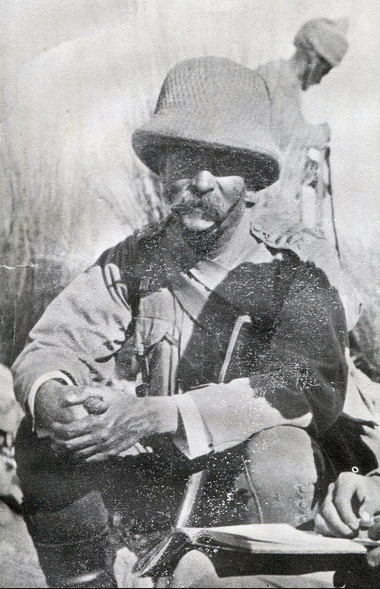
While these things were passing on the right, the other attacks of the enemy had met with more success. The camp was assaulted simultaneously on the three sides. The glow of the star shells showed that the north camp was also engaged. The enemy had been checked on the Buddhist road, by Colonel McRae and the 45th Sikhs, but another great mass of men forced their way along the Graded road in the centre of the position. On the first sound of firing the inlying picket of the 24th Punjaub Infantry doubled out to reinforce the pickets on the road, and in the water-gorge. They only arrived in time to find these being driven in by overpowering numbers of the enemy. Hundreds of fierce swordsmen swarmed unto the bazaar and into the serai, a small enclosure which adjoined. Sharpshooters scrambled up the surrounding hills, and particularly from one ragged, rock-strewn peak called Gibraltar, kept up a tremendous fire.
The defence of the left and centre or the camp was confided to the 24th Punjaub Infantry. One company of this regiment under Lieutenant Climo, charging across the football ground, cleared the bazaar at the point of the bayonet. The scene at this moment was vivid and terrible. The bazaar was crowded with tribesmen. The soldiers rushing forward amid loud cheers, plunged their bayonets into their furious adversaries. The sound of the hacking of swords, the screams of the unfortunate shopkeepers, the yells of the Ghazis were plainly heard above the ceaseless roll of musketry. The enemy now tried to force their way back into the bazaar, but the entrance was guarded by the troops and held against all assaults till about 10.45. The left flank of the company was then turned, and the pressure became so severe that they were withdrawn to a more interior line of defence, and took up a position along the edge of the “Sappers’ and Miners’ enclosure.” Another company held the approaches from the north camp. The remainder of the regiment and No.5 company Sappers and Miners, were kept in readiness to reinforce any part of the line.
It is necessary to record the actual movements of the troops in detail, but I am anxious above all things to give the reader a general idea. The enemy had attacked in tremendous strength along the two roads that gave access on the eastern side to the great cup of the Malakand. On the right road, they were checked by the brilliant movement of Colonel McRae and the courage of his regiment. Pouring in overwhelming force along the left road, they had burst into the camp itself, bearing down all opposition. The defenders, unable to hold the extended line of the rim, had been driven to take up a central position in the bottom of the cup. This central position comprised the “Sappers’ and Miners’ enclosure,” the commissariat lines and the Field Engineer Park. It was commanded on every side by the fire from the rim. But the defenders stood at bay, determined at all costs to hold their ground, bad though it was.
Meanwhile the enemy rushed to the attack with wild courage and reckless fury. Careless of life, they charged the slender line of defence. Twice they broke through and penetrated the enclosure. They were met by men as bold as they. The fighting became desperate. The general himself hurried from point to point, animating the soldiers and joining in the defence with sword and revolver. As soon as the enemy broke into the commissariat lines they rushed into the huts and sheds eager for plunder and victims.
Lieutenant Manley, the Brigade Commissariat Officer, stuck stubbornly to his post, and with Sergeant Harrington endeavoured to hold the hut in which he lived. The savage tribesmen burst in the door and crowded into the room. What followed reads like a romance.
The officer opened fire at once with his revolver. He was instantly cut down and hacked to pieces. In the struggle the lamp was smashed. The room became pitch dark. The sergeant, knocking down his assailants, got free for a moment and stood against the wall motionless. Having killed Manley, the tribesmen now began to search for the sergeant, feeling with their hands along the wall and groping in the darkness. At last, finding no one, they concluded he had escaped, and hurried out to look for others. Sergeant Harrington remained in the hut till it was retaken some hours later, and so saved his life.
Another vigorous attack was made upon the Quarter Guard. Lieutenant Watling, who met it with his company of sappers, transfixed a Ghazi with his sword, but such was the fury of the fanatic that as he fell dead he cut at the officer and wounded him severely. The company were driven back. The Quarter Guard was captured, and with it the reserve ammunition of the sappers. Lieutenant Watling was carried in by his men, and, as soon as he reached the dressing station, reported the loss of this important post.
Brigadier-General Meiklejohn at once ordered a party of the 24th to retake it from the enemy. Few men could be spared from the line of defence. At length a small but devoted band collected. It consisted of Captain Holland, Lieutenant Climo, Lieutenant Manley, R.E., the general’s orderly, a Sepoy of the 45th Sikhs, two or three sappers and three men of the 24th; in all about a dozen.
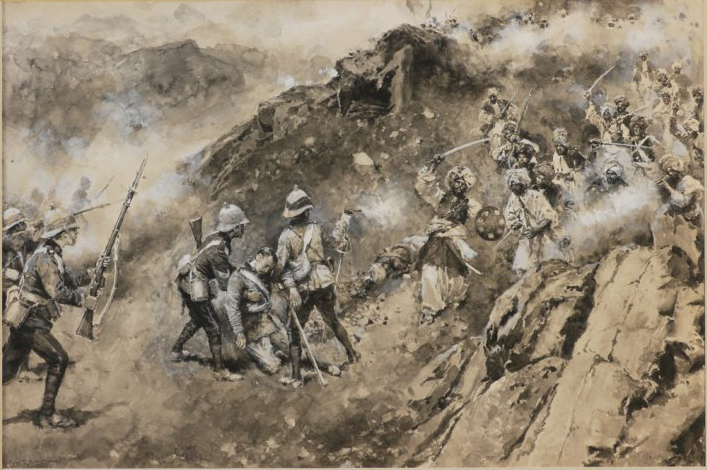
The general placed himself at their head. The officers drew their revolvers. The men were instructed to use the bayonet only. Then they advanced. The ground is by nature broken and confused to an extraordinary degree. Great rocks, undulations and trees rendered all movements difficult. Frequent tents, sheds and other buildings increased the intricacies. Amidst such surroundings were the enemy, numerous and well armed. The twelve men charged. The tribesmen advanced to meet them. The officers shot down man after man with their pistols. The soldiers bayoneted others. The enemy drew off discomfited, but half the party were killed or wounded. The orderly was shot dead. A sapper and a havildar of the 24th were severely wounded. The general himself was struck by a sword on the neck. Luckily the weapon turned in his assailant’s hand, and only caused a bruise. Captain Holland was shot through the back at close quarters by a man concealed in a tent. The bullet, which caused four wounds, grazed his spine. The party were now too few to effect anything. The survivors halted. Lieutenant Climo took the wounded officer back, and collecting a dozen more men of the 24th, returned to the attack. The second attempt to regain the Quarter Guard was also unsuccessful, and the soldiers recoiled with further loss; but with that undaunted spirit which refuses to admit defeat they continued their efforts, and at the third charge dashed across the open space, bowling over and crushing back the enemy, and the post was recovered. All the ammunition had, however, been carried off by the enemy, and as the expenditure of that night had already been enormous, it was a serious loss. The commissariat lines were at length cleared of the tribesmen, and such of the garrison as could be spared were employed in putting up a hasty defence across the south entrance of the enclosure, and clearing away the cook-houses and other shelters, which might be seized by the enemy.
The next morning no fewer than twenty-nine corpses of tribesmen were found round the cookhouse, and in the open space over which the three charges had taken place. This, when it is remembered that perhaps twice as many had been wounded and had crawled away, enables an estimate to be formed of the desperate nature of the fight for the Quarter Guard.
All this time the fire from rim into the cup had been causing severe and continual losses. The enemy surrounding the enclosure on three sides, brought a cross fire to bear on its defenders, and made frequent charges right up to the breastwork. Bullets were flying in all directions, and there was no question of shelter. Major Herbert, D.A.A.G., was hit early in the night. Later on Lieutenant-Colonel Lamb received the dangerous wound in his thigh which caused his death a few days afterwards. Many Sepoys were also killed and wounded. The command of the 24th Punjaub Infantry devolved upon a subaltern officer, Lieutenant Climo. The regiment, however, will never be in better hands.
At about one o’clock, during a lull in the firing, the company which was lining the east face of the enclosure heard feeble cries of help. A wounded havildar of the 24th was lying near the bazaar. He had fallen in the first attack, shot in the shoulder. The tribesmen, giving him two or three deep sword cuts to finish him, had left him for dead. He now appealed for help. The football ground on which he lay was swept by the fire of the troops, and overrun by the enemy’s swordsmen, yet the cry for help did not pass unheeded. Taking two Sepoys with him, Lieutenant E.W. Costello, 24th Punjaub Infantry, ran out into the deadly space, and, in spite of the heavy fire, brought the wounded soldier in safety. For this heroic action he has since received the Victoria Cross.
As the night wore on, the attack of the enemy became so vigorous, that the brigadier decided to call for a reinforcement of a hundred men from the garrison of the fort. This work stood high on a hill, and was impregnable to an enemy unprovided with field guns. Lieutenant Rawlins volunteered to try and reach it with the order. Accompanied by three orderlies, he started. He had to make his way through much broken ground infested by the enemy. One man sprang at him and struck him on the wrist with a sword, but the subaltern, firing his revolver, shot him dead, reached the fort in safety, and brought back the sorely-needed reinforcement.
It was thought that the enemy would make a final effort to capture the enclosure before dawn, that being the hour which Afghan tribesmen usually select. But they had lost heavily, and at about 3.30 A.M. began to carry away their dead and wounded. The firing did not, however, lessen until 4.15 A.M., when the sharpshooters withdrew to the heights, and the fusillade dwindled to “sniping” at long range.
The first night of the defence of the Malakand camp was over. The enemy, with all the advantages of surprise, position and great numbers, had failed to overcome the slender garrison. Everywhere they had been repulsed with slaughter. But the British losses had been severe.
BRITISH OFFICERS.
Killed—Hon. Lieutenant L. Manley, Commissariat Department.
Wounded dangerously—Major W.W. Taylor, 45th Sikhs.
Wounded severely—Lieut.-Colonel J. Lamb, 24th P.I.
" " Major L. Herbert, D.A.A.G.
" " Captain H.F. Holland, 24th P.I.
" " Lieutenant F.W. Watling, Q.O. Sappers and
Miners.
Of these Lieut.-Colonel Lamb and Major Taylor died of their wounds.
NATIVE RANKS.
Killed...... 21
Wounded..... 31
As soon as the first light of morning began to grow in the valley, two companies of the 24th advanced and cleared the bazaar of such of the enemy as had remained behind to plunder. The whole place had been thoroughly ransacked, and everything of value destroyed or carried off. The native manager had had a strange experience, and one which few men would envy. He had remained hidden in the back of a tent during the whole night in equal danger and terror of the bullets of the soldiers and the swords of the enemy. Hearing the friendly voices, he emerged uninjured from his retreat.
Desultory firing was maintained by the tribesmen all day.
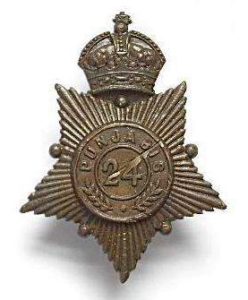
While the close and desperate fighting, which has been described, was raging in the south camp, the north camp had not been seriously involved, and had spent a quiet, though anxious night. On the sound of the firing on the Kotal being heard, four guns of No.8 Mountain Battery were moved over to the south-east side of the camp, and several star shells were fired. No large body of the enemy was however discovered. Twice during the night the camp was approached by the tribesmen, but a few rounds of shrapnel were sufficient to drive these away.
When General Meiklejohn found that the garrison of the north camp had not been severely engaged, he ordered a force consisting of two guns and the 31st Punjaub Infantry, under Major Gibbs, covered by forty sowars of the 11th Bengal Lancers, and supported by a wing of the 24th, to move out, reconnoitre the valley and clear it, as much as possible, of the enemy. The column advanced in pursuit as far as Bedford Hill. Here they came upon a large gathering of tribesmen, and as it was now evident that a great tribal rising had broken out, Major Gibbs was ordered to return and to bring his stores and troops into the Kotal camp without delay. The infantry and guns thereupon retired and fell back on the camp, covered by the 24th Punjaub Infantry.
As this regiment was being withdrawn, a sudden attack was made from the high ground above the Buddhist road, and directed against the left flank of the troops. A front was immediately shown, and the 24th advanced to meet their assailants. Lieutenant Climo, who commanded, detached a company to the right, and by this turning movement drove them off, inflicting some loss and capturing a standard. This officer’s skill and conduct in this retirement was again the subject of commendation in despatches. The troops reached their respective camps at about 11 o’clock. Meanwhile the cavalry had been ordered to push on, if possible, to Chakdara and reinforce the garrison at that post. The task was one of considerable danger, but by crossing and recrossing the Swat River, the squadron managed to cut their way through the tribesmen and reached the fort with slight loss. This brilliant ride will receive a fuller description in a later chapter.
The evacuation of the north camp proceeded very slowly. The troops packed up their kits with great deliberation, and applications were made for transport. None was, however, available. All the camels were at Dargai, on the Indian side of the mountains. Repeated orders to hurry were sent from the Kotal. All hated leaving their belongings behind, having no confidence in the liberality of a paternal Government. As the afternoon passed, the aspect of the enemy became very threatening and formidable. Great numbers drew near to the camp, and the guns were compelled to fire a good many rounds. At length, at 4 o’clock, imperative orders were sent that the north camp was to be at once abandoned, that the force there was to march to the Kotal, and that all baggage and stores, not yet removed, were to be left where they were.
All the tents were struck, but nothing else could be done, and to the deep disgust of all—officers and men—their property was left to the mercies of the enemy. During the night it was all looted and burnt. Many of the officers thus lost every stitch of clothing they possessed. The flames rising from the scene of destruction were visible far and wide, and the tribesmen in the most distant valleys were encouraged to hurry to complete the slaughter of the accursed infidels.
It cannot be doubted, however, that the concentration of the troops was a wise and judicious step. The garrison of the Kotal and south camp was insufficient, and, whatever happened, it was better for the troops to stand or fall together. The situation was also aggravated by the appearance of large numbers of tribesmen from the Utman Khel country, who crowded the hills to the west of the camp, and thus compelled the defenders to hold a greatly extended line. The abandonment of the north camp was carried out none too soon, for the enemy pressed the withdrawal of the troops, and they reached the south camp under cover of the fire of the 24th Punjaub Infantry, and the Guides Cavalry. These latter had arrived in camp at 8.30 that morning after marching all night. They found plenty of employment.
The telegraph had carried the news of the events of the night to all parts of the world. In England those returning from Goodwood Races read the first details of the fighting on the posters of the evening papers. At Simla, the Government of India awoke to find themselves confronted with another heavy task. Other messages recalled all officers to their regiments, and summoned reinforcements to the scene by road and rail. In the small hours of the 27th, the officers of the 11th Bengal Lancers at Nowshera were aroused by a frantic telegraph operator, who was astounded by the news his machine was clicking out. This man in his shirt sleeves, with a wild eye, and holding an unloaded revolver by the muzzle, ran round waking everyone. The whole country was up. The Malakand garrison was being overwhelmed by thousands of tribesmen. All the troops were to march at once. He brandished copies of the wires he had received. In a few moments official instructions arrived. The 11th Bengal Lancers, the 38th Dogras and the 35th Sikhs started at dawn. No.1 and No.7 British Mountain Batteries were also ordered up. The Guides Cavalry had already arrived. Their infantry under Lieutenant Lockhart reached the Kotal at 7.30 P.M. on the 27th, having, in spite of the intense heat and choking dust, covered thirty-two miles in seventeen and a half hours. This wonderful feat was accomplished without impairing the efficiency of the soldiers, who were sent into the picket line, and became engaged as soon as they arrived. An officer who commanded the Dargai post told me, that, as they passed the guard there, they shouldered arms with parade precision, as if to show that twenty-six miles under the hottest sun in the world would not take the polish off the Corps of Guides. Then they breasted the long ascent to the top of the pass, encouraged by the sound of the firing, which grew louder at every step.
Help in plenty was thus approaching as fast as eager men could march, but meanwhile the garrison had to face the danger as best they could alone. As the 31st Punjaub Infantry, who had been the last to leave the north camp, were arriving at the Kotal, about 1000 tribesmen descended in broad daylight and with the greatest boldness, and threatened their left flank. They drove in two pickets of the 24th, and pressed forward vigorously. Lieutenant Climo with two companies advanced up the hill to meet them, supported by the fire of two guns of the Mountain Battery. A bayonet charge was completely successful. The officers were close enough to make effective use of their revolvers. Nine bodies of the enemy were left on the ground, and a standard was captured. The tribesmen then drew off, and the garrison prepared for the attack, which they knew would come with the dark.
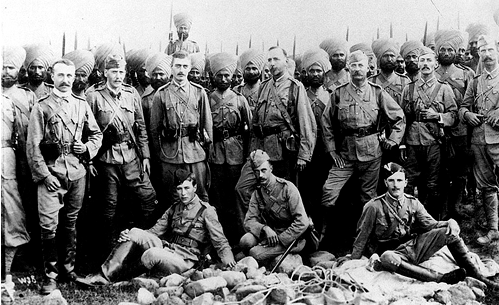
As the evening drew on the enemy were observed assembling in ever-increasing numbers. Great crowds of them could be seen streaming along the Chakdara road, and thickly dotting the hills with spots of white. They all wore white as yet. The news had not reached Buner, and the sombre-clad warriors of Ambeyla were still absent. The glare of the flames from the north camp was soon to summon them to the attack of their ancient enemies. The spectacle as night fell was strange, ominous, but not unpicturesque. Gay banners of every colour, shape and device, waved from the surrounding hills. The sunset caught the flashing of swordblades behind the spurs and ridges. The numerous figures of the enemy moved busily about preparing for the attack. A dropping fire from the sharpshooters added an appropriate accompaniment. In the middle, at the bottom of the cup, was the “crater” camp and the main enclosure with the smoke of the evening meal rising in the air. The troops moved to their stations, and, as the shadows grew, the firing swelled into a loud, incessant roar.
The disposition of the troops on the night of the 27th was as follows:—
1. On the right Colonel McRae, with 45th Sikhs and two guns supported by 100 men of the Guides Infantry, held almost the same position astride the Buddhist road as before.
2. In the centre the enclosure and Graded road were defended by—
31st Punjaub Infantry.
No.5 Company Q.O. Sappers and Miners.
The Guides.
Two Guns.
3. On the left the 24th Punjaub Infantry, with the two remaining guns under Lieutenant Climo, held the approaches from the abandoned north camp and the fort.
Most of this extended line, which occupied a great part of the rim, was formed by a chain of pickets, detached from one another, and fortified by stone breastworks, with supports in rear. But in the centre the old line of the “Sappers’ and Miners’ enclosure” was adhered to. The bazaar was left to the enemy, but the serai, about a hundred yards in front of the main entrenchment, was held by a picket of twenty-four men of the 31st Punjaub Infantry, under Subadar Syed Ahmed Shah. Here it was that the tragedy of the night occurred.
At eight o’clock, the tribesmen attacked in tremendous force all along the line. The firing at once became intense and continuous. The expenditure of ammunition by the troops was very great, and many thousands of rounds were discharged. On the right Colonel McRae and his Sikhs were repeatedly charged by the swordsmen, many of whom succeeded in forcing their way into the pickets and perished by the bayonet. Others reached the two guns and were cut down while attacking the gunners. All assaults were however beaten off. The tribesmen suffered terrible losses. The casualties among the Sikhs were also severe. In the morning Colonel McRae advanced from his defences, and, covered by the fire of his two guns, cleared the ground in his front of the enemy.
The centre was again the scene of severe fighting. The tribesmen poured into the bazaar and attacked the serai on all sides. This post was a mud-walled enclosure about fifty yards square. It was loopholed for musketry, but had no flank defences. The enemy made determined efforts to capture the place for several hours. Meanwhile, so tremendous was the fire of the troops in the main enclosure, that the attack upon the serai was hardly noticed. For six hours the picket there held out against all assaults, but the absence of flank defences enabled the enemy to come close up to the walls. They then began to make holes through them, and to burrow underneath. The little garrison rushed from place to place repelling these attacks. But it was like caulking a sieve. At length the tribesmen burst in from several quarters, and the sheds inside caught fire. When all the defenders except four were killed or wounded, the Subadar, himself struck by a bullet, ordered the place to be evacuated, and the survivors escaped by a ladder over the back wall, carrying their wounded with them. The bodies of the killed were found next morning, extraordinarily mutilated.
The defence of this post to the bitter end must be regarded as a fine feat of arms. Subadar Syed Ahmed Shah was originally promoted to a commission for an act of conspicuous bravery, and his gallant conduct on this occasion is the subject of a special paragraph in despatches. [The Subadar and the surviving Sepoys have since received the “Order of Merit.”]
On the left, the 24th Punjaub Infantry were also hotly engaged, and Lieutenant Costello received his first severe wound from a bullet, which passed through his back and arm. Towards morning the enemy began to press severely. Whereupon Lieutenant Climo, always inclined to bold and vigorous action, advanced from the breastworks to meet them with two companies. The tribesmen held their ground and maintained a continual fire from Martini-Henry rifles. They also rolled down great stones upon the companies. The 24th continued to advance, and drove the enemy from point to point, and position to position, pursuing them for a distance of two miles. “Gallows Tree” hill, against which the first charge of the counter attack was delivered, was held by nearly 1000 tribesmen. On such crowded masses, the fire of the troops was deadly. The enemy left forty dead in the path of Lieutenant Climo’s counter attack, and were observed carrying off many wounded. As they retreated, many took refuge in the village of Jalalkot. The guns were hurried up, and ten shells were thrown into their midst, causing great slaughter. The result of this bold stroke was, that the enemy during the rest of the fighting invariably evacuated the hills before daylight enabled the troops to assume the offensive.
Thus the onslaught of the tribesmen had again been successfully repelled by the Malakand garrison. Many had been killed and wounded, but all the tribes for a hundred miles around were hurrying to the attack, and their number momentarily increased. The following casualties occurred on the night of the 27th:—
BRITISH OFFICER.
Wounded—Lieutenant E.W. Costello.
NATIVE RANKS.
Killed...... 12
Wounded..... 29
During the day the enemy retired to the plain of Khar to refresh themselves. Great numbers of Bunerwals now joined the gathering. The garrison were able to distinguish these new-comers from the Swatis, Utman Khels, Mamunds, Salarzais and others, by the black or dark-blue clothes they wore. The troops were employed in strengthening the defences, and improving the shelters. The tribesmen kept up a harassing and annoying long-range fire, killing several horses of the Guides Cavalry. Towards evening they advanced to renew the attack, carrying hundreds of standards.
As darkness fell, heavy firing recommenced along the whole front. The enemy had apparently plenty of ammunition, and replied with effect to the heavy fire of the troops. The arrangement of the regiments was the same as on the previous night. On the right, Colonel McRae once more held his own against all attacks. In the centre, severe fighting ensued. The enemy charged again and again up to the breastwork of the enclosure. They did not succeed in penetrating. Three officers and several men were however wounded by the fire. Lieutenant Maclean, of the Guides Cavalry, who was attached temporarily to the 31st Punjaub Infantry, had a wonderful escape. A bullet entered his mouth and passed through his cheek without injuring the bone in any way. He continued on duty, and these pages will record his tragic but glorious death a few weeks later at Landakai.
Lieutenant Ford was dangerously wounded in the shoulder. The bullet cut the artery, and he was bleeding to death when Surgeon-Lieutenant J.H. Hugo came to his aid. The fire was too hot to allow of lights being used. There was no cover of any sort. It was at the bottom of the cup. Nevertheless the surgeon struck a match at the peril of his life and examined the wound. The match went out amid a splutter of bullets, which kicked up the dust all around, but by its uncertain light he saw the nature of the injury. The officer had already fainted from the loss of blood. The doctor seized the artery, and, as no other ligature was forthcoming, he remained under fire for three hours holding a man’s life, between his finger and thumb. When at length it seemed that the enemy had broken into the camp he picked up the still unconscious officer in his arms, and, without relaxing his hold, bore him to a place of safety. His arm was for many hours paralysed with cramp from the effects of the exertion of compressing the artery.
I think there are few, whatever may be their views or interests, who will not applaud this splendid act of devotion. The profession of medicine, and surgery, must always rank as the most noble that men can adopt. The spectacle of a doctor in action among soldiers, in equal danger and with equal courage, saving life where all others are taking it, allaying pain where all others are causing it, is one which must always seem glorious, whether to God or man. It is impossible to imagine any situation from which a human being might better leave this world, and embark on the hazards of the Unknown.
All through the night, the enemy continued their attacks. They often succeeded in reaching the breastworks—only to die on the bayonets of the defenders. The guns fired case shot, with terrible effect, and when morning dawned the position was still held by the Imperial Forces. The casualties of the night were as follows:—
BRITISH OFFICERS.
Wounded severely—Lieutenant H.B. Ford, 31st Punjaub Infantry.
" H.L.S. Maclean, the Guides.
Wounded slightly—Lieutenant G. Swinley, 31st Punjaub Infantry.
NATIVE RANKS.
Killed....... 2
Wounded...... 13
On the morning of the 29th signalling communication with Chakdara was for a few moments re-established. The garrison of that post announced their safety, and that all attacks had been repulsed with heavy loss, but they reported that ammunition and food were both running short. During the day the enemy again retired to the plain to rest, and prepare for the great attack, which they intended making that night. The hour would be propitious. It was Jumarat, on which day the prophet watches with especial care over the interests of those who die for the faith. Besides, the moon was full, and had not the Great Fakir declared that this should be the moment of victory? The Mullah exhorted them all to the greatest efforts, and declared that he would himself lead the assault. To-night the infidels would be utterly destroyed.
Meanwhile the troops were busily employed, in spite of their terrible fatigues, in strengthening the defences. The bazaar and the serai were levelled. Trees were blown up, and a clear field of fire was obtained in front of the central enclosure. Great bonfires were also prepared on the approaches, to enable the soldiers to take good aim at their assailants, while they were silhouetted against the light. In such occupations the day passed.
The tribesmen continued to fire at long range and shot several horses and mules. These sharpshooters enjoyed themselves immensely. After the relief of Chakdara, it was found that many of them had made most comfortable and effective shelters among the rocks. One man, in particular, had ensconced himself behind an enormous boulder, and had built a little wall of stone, conveniently loopholed, to protect himself when firing. The overhanging rock sheltered him from the heat of the sun. By his side were his food and a large box of cartridges. Here for the whole week he had lived, steadily dropping bullets unto the camp and firing at what an officer described as all “objects of interest.” What could be more attractive?
At four o’clock in the afternoon Major Stuart Beatsen, commanding the 11th Bengal Lancers, arrived with his leading squadron. He brought a small supply of ammunition, which the garrison was in sore need of, the expenditure each night being tremendous, some regiments firing as much as 30,000 rounds. The 35th Sikhs and 38th Dogras under Colonel Reid arrived at Dargai, at the foot of the pass, in the evening. They had marched all day in the most intense heat. How terrible that march must have been, may be judged from the fact, that in the 35th Sikhs twenty-one men actually died on the road of heat apoplexy. The fact that these men marched till they dropped dead, is another proof of the soldierly eagerness displayed by all ranks to get to the front. Brigadier-General Meiklejohn, feeling confidence in his ability to hold his own with the troops he had, ordered them to remain halted at Dargai, and rest the next day.
The attack came with the night, but the defences in the centre had been much improved, and the tribesmen were utterly unable to cross the cleared glacis, which now stretched in front of the enclosure. They, however, assailed both flanks with determination, and the firing everywhere became heavy. At 2 A.M. the great attack was delivered. Along the whole front and from every side enormous numbers swarmed to the assault. On the right and left, hand-to-hand fighting took place. Colonel McRae again held his position, but many of the tribesmen died under the very muzzles of the rifles. The 24th Punjaub Infantry on the left were the most severely engaged. The enemy succeeded in breaking into the breastworks, and close fighting ensued, in which Lieutenant Costello was again severely wounded. But the fire of the troops was too hot for anything to live in their front. At 2.30 the Mad Mullah being wounded, another Mullah killed and several hundreds of tribesmen slain, the whole attack collapsed. Nor was it renewed again with vigor. The enemy recognised that their chance of taking the Malakand had passed.
The casualties were as follows on the night of the 29th:—
BRITISH OFFICERS.
Wounded severely—Lieutenant E.W. Costello, 24th P.I., who had
already been severely wounded, but continued
to do duty.
" " Lieutenant F.A. Wynter, R.A.
NATIVE RANKS.
Killed...... 1
Wounded..... 17
All the next day the enemy could be seen dragging the dead away, and carrying the wounded over the hills to their villages. Reinforcements, however, joined them, and they renewed their attack, but without much spirit, at 9.30 P.M. They were again repulsed with loss. Once, during a thunderstorm that broke over the camp, they charged the 45th Sikhs’ position, and were driven off with the bayonet. Only two men were wounded during the night.
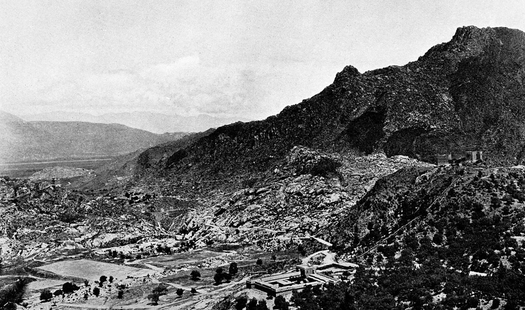
In the morning the 38th Dogras and 35th Sikhs marched into the camp. The enemy continued firing into the entrenchments at long range, but without effect. They had evidently realised that the Malakand was too strong to be taken. The troops had a quiet night, and the weary, worn-out men got a little needed sleep. Thus the long and persistent attack on the British frontier station of Malakand languished and ceased. The tribesmen, sick of the slaughter at this point, concentrated their energies on Chakdara, which they believed must fall into their hands. To relieve this hard-pressed post now became the duty of the garrison of Malakand.
The chapter, which may now appropriately end, has described in detail, and, necessarily, at length, the defence of an outpost of our Empire. A surprise, followed by a sustained attack, has been resisted. The enemy, repulsed at every point, have abandoned the attempt, but surround and closely watch the defences. The troops will now assume the offensive, and the hour of reprisals will commence.
The casualties sustained by the Malakand garrison between 26th July and 1st August were as follows:—
